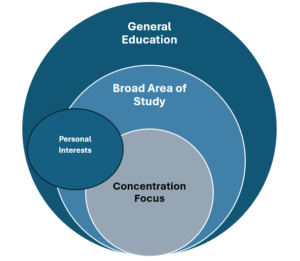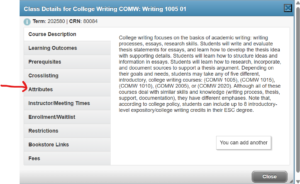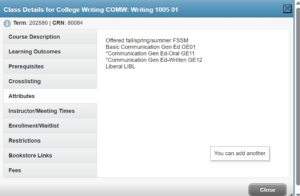Course Choice: General Education, Degree Focus, & More

You make decisions about courses in different contexts, and for different purposes.
- All degrees are required to have courses that fulfill SUNY general education requirements.
- Within that framework, there are courses that are in your broad area of study.
- More specific concentration courses fit into your broad area of study.
- Courses that fulfill personal interests may overlap with courses that you choose for general education, your broad area of study, or your concentration focus, or they may be totally different elective courses, depending on the room you have in your degree.
It’s the hope that there’s enough choice, within all of the contexts in which you choose courses, so that you can find courses that spark your interest.
In order to choose courses, you need to know the resources to consult and what to look for in terms of course information.
Choosing Courses to fulfill SUNY General Education Requirements

Like most universities in the United States, the State University of New York system requires an array of general education courses in a variety of areas for all degrees.
The idea behind general education is to expose you to a wider variety of thinking and engaging with the world than what is offered in your degree focus. It’s also to enhance skills and competencies needed for contemporary society (e.g., communication, information literacy).
The following video provides interesting information on Steve Jobs and a college course he took on calligraphy, in order to explain the value of the liberal arts, the types of courses the SUNY general education requirement covers.
This video offers information on what “liberal arts” means and how it can be useful in the 21st century.
The goal of general education is to provide some familiarity with the liberal arts – e,g, science, history, literature, social science – that interest you, so that you develop different perspectives while pursuing your degree.
Consult Empire’s page on General Education to see general education areas. Note the following information on that page:
“A minimum of 30 credits in 7 of 10 categories of knowledge and skills areas are required for AA-, AS-, and all baccalaureate-degree programs, as well as the two core competencies.” [1]
That means that you have to fulfill the areas that say “Required,” and then can choose three of the remaining six general education areas that interest you. You can also include more general education areas in your degree if you choose – a total of seven areas/30 credits is the minimum.
To find General Education courses:
- Go to your student home page –> Registration –> Term Guide
- Find the correct term in which you want to take courses
- Search for general education courses by Attribute. A drop-down list of the different general education areas will appear.
Choosing Courses to Develop your Degree Focus

To find courses to develop your degree focus, go to Empire’s catalog page on Undergraduate Programs. Look at the degree that you want to pursue, and note whether it has required courses or required foundation areas.
Use the course lists to choose appropriate courses. Go to the Term Guide to make sure the course is being offered in the term you want.
For a degree without an asterisk – the more structured professional degrees – you will eventually need to complete all of the required courses listed.
For a degree with an asterisk, you will need to have at least one course per foundation area. Since a degree with an asterisk can be more flexible, remember that you have more choice than the courses listed. If your choice is different than what’s listed for a foundation area, make sure to consult your mentor/advisor before you register to discuss whether that course can logically fulfill the knowledge required for that foundation area.
Summary:
Deciding on General Education & Degree Focus Courses

Consider the nature of your own proposed degree. If you decided to pursue a professional focus, are there liberal arts/general education courses that might enhance that focus?
If you decided to pursue a more liberal arts focus in a specific academic area (history, creative writing, interdisciplinary studies, etc.), are there professionally-focused courses that might enhance your current or future professional plans?
A report from the Strada Institute for the Future of Work discusses the need to combine professional and liberal education: Robot-Ready: Human+ Skills for the Future of Work. You can download the report for free. Read the executive summary at the start of the report.
Consider this information when choosing general education courses and courses that address the focus of your degree.
Other Useful Course Decision Information
Attributes
Once you are in the Term Guide and looking at a course description, click on Attributes from the course description page. You’ll find useful information such as how often the course is offered.
You’ll also find information about what general education areas the course fulfills, and whether the course carries liberal credit. The number of liberal credits in your overall degree determine your type of degree (B.A., B.S., etc.).


Course Level: Introductory/Advanced
In the Term Guide
- courses numbered in the 1000s and 2000s are introductory (freshman-sophomore)
- courses numbered in the 3000s and 4000s are advanced (junior-senior)
- courses numbered higher than 4000 are graduate courses, which are not appropriate for associate and bachelor’s degrees (unless there are special circumstances)
From a course description in the Term Guide, you can also find out whether there are prerequisites, especially for an advanced-level course.
- Empire State University, General Education, https://catalog.sunyempire.edu/undergraduate/earning-undergraduate-degree/gened/#sunygenedframeworkfall2023text ↵
